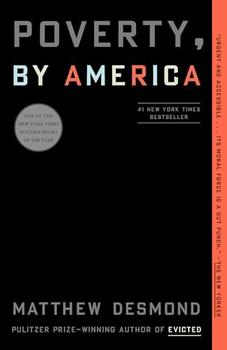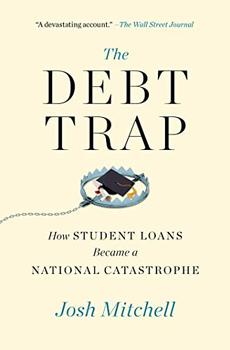Summary | Excerpt | Reviews | Beyond the book | Read-Alikes | Genres & Themes | Author Bio

Poverty and Profit in the American City
by Matthew DesmondWe routinely hear talk about the one percent and the growing divide between the rich and the poor, yet it is difficult to fathom just exactly what extreme poverty looks like or how it can manifest itself. This is exactly what Matthew Desmond, a MacArthur genius who is recognized for his work on the impact of eviction on the urban poor, helps us with so well. Poverty, Desmond argues, is not just about poor people, but also about the relationship between the rich and poor. "To understand poverty, I needed to understand that relationship," he writes in his book Evicted: Poverty and Profit In the American City. "This sent me searching for a process that bound poor and rich people together in mutual dependence and struggle. Eviction was such a process."
Through years of intensive work on the ground, Desmond's essential book tells an American story focusing on two landlords in Milwaukee, the fourth poorest city in the United States: Sherrena Tarver, a black schoolteacher turned inner-city businesswoman who owns a number of properties in the city's ghettos, and Tobin Charney, a white man, who owns a rundown trailer park. Among their many tenants who are constantly evicted or in danger of being thrown out are Arleen, a young black woman with two boys; Lamar, a black disabled man with two sons struggling to find a place of his own; Larraine, a white woman struggling to make rent with no job prospects, and Scott, a white gay drug addict who loses his nursing license.
By focusing on these eight people's everyday lives, Desmond shows us the complexities of poverty and eviction, a problem that cuts across racial lines. Desmond, who moved into the Tobin trailer park in 2008 for his work, steers clear of sensational or exploitative writing. These are nuanced portraits of people, painted with all their frailties and strengths. Desmond's light touch weaves in social commentary without much grandstanding. When Larraine, for example, spends the last of her money and food stamps on a lobster and crab dinner, Desmond brilliantly explains why: "the distance between grinding poverty and even stable poverty could be so vast that those at the bottom had little hope of climbing out even if they pinched every penny. So they chose not to. Instead, they tried to survive in color, to season the suffering with pleasure. They would get a little high or have a drink or do a bit of gambling or acquire a television. They might buy lobster on food stamps. If Larraine spent her money unwisely, it was not because her benefits left her with so much but because they left her with so little."
In a book filled with deeply moving images, one of the most touching is of a school-aged child, Ruby Hinkston, visiting a local library in Milwaukee and checking in on her "house" which she builds through a free online game called Millsberry, a marketing tool created by General Mills. Ruby's make-believe house had "clean, light-reflecting floors, a bed with sheets and pillowcases, and a desk for doing schoolwork." The tragedy implicit in Ruby's seemingly routine pastime is that the real house that her family rents from Sherrena was stunningly deplorable: it had a non-functioning toilet, a kitchen sink brimming with gray water and lined with a rust-orange film. The house got so bad that everyone became withdrawn and lethargic. We might ask why the Hinkstons just couldn't ask their landlord to fix at least the toilet and the kitchen sink. The answer? Money. They were told they already owed $2,494.50 in back rent and other payments, so asking for repairs would only invite more scrutiny. They were, in fact, prime targets for eviction.
Evicted switches back and forth between different sets of people, which sometimes makes it difficult to keep everyone's story straight. But a positive outcome of this technique is that the accounts end up sharing many common threads: the same desperation, the same hand-to-mouth existence, the same bargains struck to stay on.
Evicted is an unforgettable portrait of class divides which also shines light on how race skews the equation to even worse outcomes. For example, some properties are designated "nuisance" when an excessive number of 911 calls issue from them – the onus falls on the landlord to clear things up. "In white neighborhoods, only 1 in 41 properties that could have received a nuisance citation did receive one," Desmond points out. In black neighborhoods, that number was 1 in 16. African American women, afraid of inviting landlords' wrath because of 911 calls they place, often suffered abuse silently as a result. Evicted is also impressive in its portrayal of the landlords as pragmatic people who are trying to make money while keeping a stable roster of tenants. Sherrena, for example, is not an evil person; she often makes concessions until events force her hand.
Desmond's important book might set out practical prescriptions for solutions such as improving the size of the housing voucher program (See Beyond the Book), but the deeply touching portraits are what really make Evicted the heavyweight that it is. It should be mandatory reading for everyone, especially politicians and others who walk the corridors of power. That such bruising poverty can exist in the world's richest country is a scathing indictment of our regulatory policies.
At one point in the narrative, a frustrated tenant, bemoaning her situation, breaks down and screams: "This is America! This is America!" Damn right. It is.
![]() This review was originally published in The BookBrowse Review in March 2016, and has been updated for the
March 2017 edition.
Click here to go to this issue.
This review was originally published in The BookBrowse Review in March 2016, and has been updated for the
March 2017 edition.
Click here to go to this issue.

If you liked Evicted, try these:

by Matthew Desmond
Published 2024
The Pulitzer Prize–winning, bestselling author of Evicted reimagines the debate on poverty, making a new and bracing argument about why it persists in America: because the rest of us benefit from it.

by Josh Mitchell
Published 2022
From acclaimed Wall Street Journal reporter Josh Mitchell, the dramatic, untold story of student debt in America.
Your guide toexceptional books
BookBrowse seeks out and recommends the best in contemporary fiction and nonfiction—books that not only engage and entertain but also deepen our understanding of ourselves and the world around us.